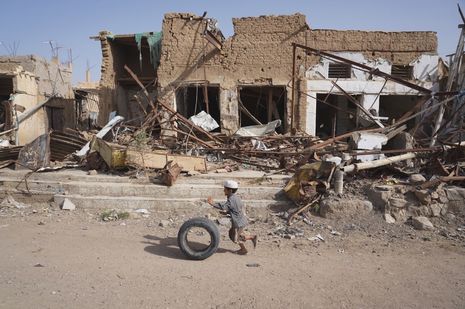Cambridge must cut ties with arms manufacturers
Now that Cambridge has found the courage to stand with Ukraine, it must examine the ways in which its activities legitimise and support other illegal wars around the world, argue Maddy Fisher, Talal Hangari, and Alicia Cash

Content note: contains discussion of war and imperialism
The University of Cambridge has joined the chorus of calls opposing the heinous invasion of Ukraine. Vice-Chancellor Stephen Toope, in a statement sent to all students and staff told us: “I strongly condemn this unprovoked act of war, and affirm democratic Ukraine’s sovereignty, independence, and territorial integrity.” Toope is undoubtedly right to oppose this war, yet one wonders where this commitment to peace and new lease of conscience has been hiding while the University has, for centuries, been complicit in various atrocities. Cambridge, like many institutions, must reckon with the destructive relationships it has fostered with the global war machine.
In a message sent on Wednesday, the Vice-Chancellor wrote that “the relevant University committee has been reviewing gifts and donations for any funding or institutional research links related to the Russian Federation”. He added that “for the past few years”, Cambridge “has received no research funding from institutions within the Russian Federation, or from individuals currently facing sanctions”, and that “The Cambridge University Endowment Fund has no direct investments in Russia, and only negligible indirect exposure through pooled investments.” In short, Cambridge has taken measures to ensure that it is not complicit in the present war. Strikingly, the same approach has not materialised with respect to crimes that are supported by our own government, and for which we have a much greater burden of moral responsibility.
“Cambridge’s ties to violence are no secret”
Cambridge’s ties to violence are no secret. The University was built on the profits of colonialism and slavery, and such ties with human rights violators continue today. Not too long ago, Cambridge hit national newspapers for considering a partnership with the repressive United Arab Emirates. The University sees no moral issue in accepting grants from corporations that supply weaponry and technical assistance to the Saudi Arabian military in its catastrophic bombardment of Yemen, which the UN has designated the site of the world’s worst humanitarian crisis. In 2019-20, Cambridge received £64,000 from BAE Systems, and allows BAE to persistently recruit our students, despite long standing opposition from local activist group, Demilitarise Cambridge. Planes manufactured by BAE Systems have been used to bomb hospitals and schools in Yemen, causing countless civilian deaths.
The University also has links with Boeing, whose bomb guidance kits are used to devastate Gaza, and Rolls Royce, which provides the engines for approximately 25% of all global military aircraft. Caterpillar, whose bulldozers and heavy equipment are used to demolish Palestinian homes and construct illegal checkpoints, is offered legitimacy and consultancy from the University through the Cambridge Service Alliance. These examples illustrate the tight entanglement between our University and the globe-spanning imperialist violence enabled by the arms trade. So, when Toope states that “The University of Cambridge has received no research funding from institutions within the Russian Federation”, it’s hard to see this as a moral, rather than a tactical, stance.
“The University has the capacity to sever its links to criminal actions”
In May 2021, the Palestine Society’s open letter to the Vice-Chancellor, which received over 1,500 signatures, demanded that the University undertake “a formal review of institutional ties with all corporations implicated in illegal Israeli policies.” Leading human rights organisations, including B’Tselem and Human Rights Watch, had already found by this time that Israeli policies amounted to apartheid, a crime against humanity under international law. Since then, Amnesty International has made the same finding. In his private response to the open letter, Toope sidestepped the demand for a review, instead limiting his remarks to saying that he was “saddened over the loss of life and suffering caused by the recent escalation of violence between Israeli and Palestinian forces.” The University has the capacity to review and sever its links to criminal actions; it is an extraordinary moral failing that it has not even considered doing so for cases including Yemen and Palestine, even after prompting from students.
This is sadly reflected in global coverage of war. We are told that Ukrainians are ‘civilised’ and ‘European’, that war is an acceptable fact of life for non-white people around the world, but utterly shocking on European land after the Second World War. This is detestable: war and its horrors should not be condoned in Ukraine nor in Yemen. All victims of war, all refugees, deserve our support. Cambridge should resist this racist view of war, yet so far has actively contributed to it.
The University’s decision to investigate its relations with Russia is an appropriate step. Yet, if Cambridge has any moral seriousness about war, it must immediately sever all ties with corporations like BAE Systems, particularly now that it has revealed it has the rudimentary moral capacity to respond to outrageous acts of violence. This rare moment of reflection could also be a chance for the University to consider its relationships with other destructive industries, such as those involved in fossil fuel extraction and border control.
The University’s gestures of support, available only to certain victims, will continue to fall short while material ties to arms manufacturers remain intact and while its research is used to harm civilians. If the University really has found its conscience, it must now undertake a programme to end its relations with the arms trade and to respond seriously to all conflicts that affect the University community.
 News / Cambridge academics sign open letter criticising research funding changes22 February 2026
News / Cambridge academics sign open letter criticising research funding changes22 February 2026 News / Supporters protest potential vet school closure22 February 2026
News / Supporters protest potential vet school closure22 February 2026 News / University Council rescinds University Centre membership20 February 2026
News / University Council rescinds University Centre membership20 February 2026 News / Hundreds of Cambridge academics demand vote on fate of vet course20 February 2026
News / Hundreds of Cambridge academics demand vote on fate of vet course20 February 2026 Comment / A tongue-in-cheek petition for gowned exams at Cambridge 21 February 2026
Comment / A tongue-in-cheek petition for gowned exams at Cambridge 21 February 2026









